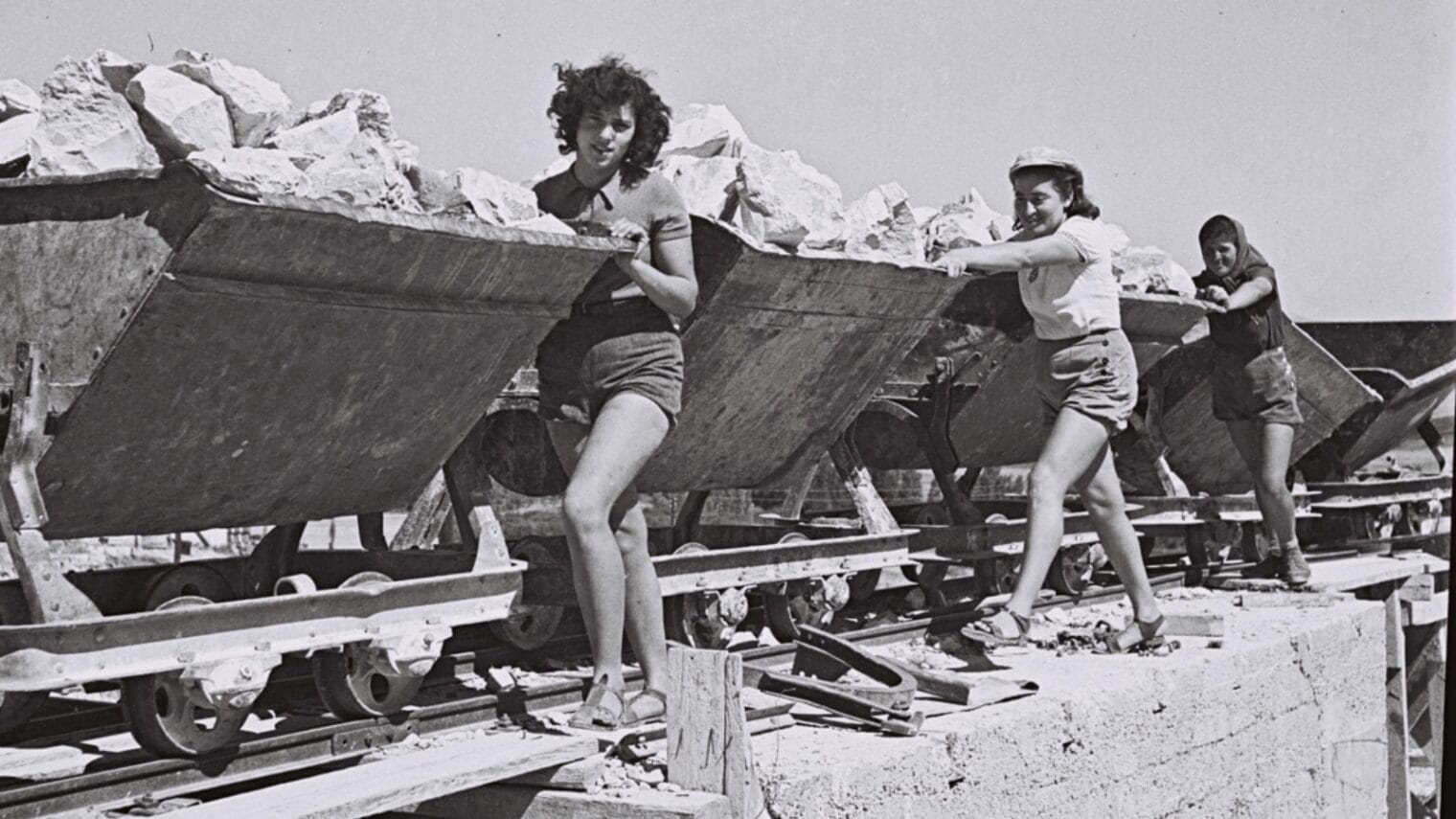Imagine being a woman worker on an Israeli kibbutz, defending your home and family against unrelenting Hamas attacks. That’s what these courageous women did, standing as beacons of resilience in the face of danger. Their stories of bravery and determination are often untold, but their courage knows no bounds.
A Legacy of Strength
The heart of Israel beats strong in its kibbutzim, these unique communities built on shared values and hard work. And in the aftermath of the recent Hamas attacks, it’s the women of the kibbutzim whose strength and spirit shine through the darkness.
For generations, women have been drawn to the kibbutzim, seeking a life built on equality and purpose. In the early days, they worked side-by-side with men in the fields, their contributions essential to building a new way of life. As the kibbutzim grew and evolved, so did the roles of women. They became the heart of education and childcare, nurturing the next generation with care and dedication.
Today, the women of the kibbutzim hold positions as diverse as the communities themselves. They are farmers, teachers, artists, entrepreneurs – their talents and passions woven into the very fabric of kibbutz life.
Recent events, however, have cast a shadow over these peaceful communities. The October 7th attacks have left their mark, a stark reminder of the fragility of peace, particularly for those living in kibbutzim near the Gaza border. We hear stories like Irit Lahav’s, her voice trembling as she describes using a vacuum cleaner and a rolling pin to barricade her safe room door during the Nir Oz attack. It’s a chilling reminder that even the most secure shelters can sometimes feel vulnerable. The Nir Oz attack resulted in significant casualties, with an estimated 30% of its residents either killed or kidnapped.
The emotional toll on the survivors, especially women and children, is immeasurable. The trauma of that day will likely linger, a heavy weight on their hearts and minds. This attack, along with others, has disrupted the daily lives of kibbutz residents, including work routines, childcare, and the sense of security once prevalent in these communities.
Profiles in Courage
Amidst the tragedy, stories of remarkable bravery have emerged.
When Hamas militants stormed Kibbutz Nir Am, 25-year-old Inbal Lieberman, the kibbutz’s security coordinator, didn’t hesitate. She sprinted to the armory, grabbed weapons, and quickly distributed them to other residents, organizing a desperate defense against the heavily armed militants. For four long, terrifying hours, she and a small, determined group of residents held the attackers at bay. Their courage and tenacity in the face of such overwhelming odds were truly remarkable.
Lieberman’s heroic actions weren’t just a testament to her individual strength but also highlighted the vital role women have always played in Israeli kibbutzim. These women, often juggling the responsibilities of family and work, have long been pillars of their communities, facing challenges head-on and contributing significantly to the success of these unique social structures.
In another act of exceptional bravery, 25-year-old Inbar Lieberman, a security coordinator, defended Kibbutz Nir Am against Hamas attacks, neutralizing five terrorists herself and leading her team to kill 20 more. Lieberman’s actions prevented any casualties in her kibbutz, making her a symbol of resilience and heroism.
These acts of courage are not isolated incidents but rather powerful examples of the strength and resilience that women in Israeli society embody.
Life, Work, and Equality in the Kibbutzim
Can you still work on a kibbutz in Israel?
You bet! Even though things have changed in Israel recently, many kibbutzim are still going strong and love having volunteers. While life on a kibbutz isn’t exactly how it used to be, it’s still a one-of-a-kind experience. Think cultural deep dive, communal living, and getting your hands dirty with some real work.
So, what kind of kibbutz experience are we talking about? Well, it depends! They’re not all stuck in the past:
- Traditional kibbutzim: These are like stepping back in time. Think shared everything – work, living spaces, even deciding things together. It’s all about equality and working together.
- Privatized kibbutzim: These guys have joined the 21st century with a bit more of a business mindset, but they haven’t totally ditched the whole community living vibe.
- Urban kibbutzim: Forget fields and tractors, these kibbutzim are all about city life. They’re big on social change and making cities greener and more connected.
Ready to jump into kibbutz life? Here’s the lowdown on volunteering:
- Age limit? Most kibbutzim like their volunteers to be between 18 and 35. But hey, age is just a number, right? Some might welcome you with open arms even if you’re a bit older. Doesn’t hurt to ask!
- What will I actually be doing? Get ready to wear many hats! You could be farming, working in a factory, looking after kids, or even teaching. It’s a mixed bag, and that’s part of the adventure.
- Where will I sleep? Don’t expect a five-star hotel. It’s usually shared rooms or dorms. Think of it as making new friends, kibbutz-style!
- What’s for dinner? Everyone eats together. It’s all about that family feeling (and you might discover some amazing Israeli dishes!).
- What about the culture? This is where it gets interesting. Living on a kibbutz throws you right into Israeli culture. You’ll pick up some Hebrew, learn about their history, and get a real feel for the place.
Why would anyone choose to volunteer on a kibbutz?
Glad you asked!
- Work experience, but not your average 9-to-5: You’re not just getting work experience; you’re getting it in a totally different culture. Talk about standing out from the crowd!
- Become an Israeli culture pro: You’ll understand Israel in a way most tourists never will.
- Make a difference: You’re not just there for yourself; your work benefits the whole community.
- Learn to live a little differently: Discover a whole new way of life—one that’s all about sustainability and cooperation.
- Spice up your resume: Seriously, who else can say they lived and worked on a kibbutz? It’s an experience that makes employers sit up and take notice.
Before you pack your bags, here are a few things to keep in mind:
- Safety first: Do your homework. Not all kibbutzim are created equal. Some might be in safer areas than others. Research is key!
- Get ready for a change of pace: Kibbutz life is different. It’s communal, it can be intense, and it’s definitely not for everyone. Be honest with yourself about what you can handle.
- Rules are rules: Kibbutzim have their own way of doing things. Respect that. It’s their home, after all.
- Keep an open mind: Be ready for anything. You’ll encounter new customs, different foods, and ways of life that might surprise you. Embrace it!
So, is a kibbutz experience right for you?
It’s a unique blend of hard work, community spirit, and a chance to learn about another culture. It’s challenging, it’s rewarding, and it’s definitely an experience you won’t forget. If you’re adventurous, open-minded, and ready to roll up your sleeves, a kibbutz might just be the perfect adventure.
What Jobs Can You Do on a Kibbutz in Israel?
So you’re curious about life on a kibbutz, huh? It’s not all about farming anymore, though you can certainly find that! These days, kibbutzim need all sorts of skills to keep things running smoothly. Think of it like a small town that needs everything from teachers and techies to cooks and carpenters.
Let’s dive into some of the jobs you might find on a kibbutz:
Getting your hands dirty (or not!):
- Agriculture: Of course, some kibbutzim still have strong agricultural roots. You could find yourself planting and harvesting crops, caring for livestock, or even operating some pretty cool farm machinery.
- Hospitality: Kibbutzim often host guests, which means they need friendly faces in their guesthouses and dining halls. You might be welcoming guests, serving meals, or even whipping up delicious food in the kitchen.
- Maintenance: Things break, and buildings need upkeep. If you’re handy, a kibbutz always needs people who can fix things, paint, and generally keep the place looking sharp.
Beyond the basics:
- Education: Kibbutzim have their own schools and childcare centers. If you have a knack for working with kids, you might find yourself teaching, assisting in classrooms, or caring for little ones.
- Healthcare: Many kibbutzim have their own clinics to take care of their community’s health needs. Think nurses, therapists, and other medical professionals.
- Technology: Yep, even kibbutzim are getting in on the tech scene! Some kibbutzim have businesses that require software developers, IT support specialists, and other tech wizards.
Now, here’s the thing: some of these jobs are volunteer positions, while others are paid. Volunteering is a great way to experience kibbutz life, but it usually means you’ll be doing things like farm work, childcare, or general maintenance. Paid jobs often require specific skills and experience. The good news is, they might come with perks like housing and healthcare.
Picking the right kibbutz for you depends on what kind of work you’re interested in, whether you’re looking for a volunteer or paid position, and even the vibe of the place. Some are bigger, some are smaller, some are near bustling cities, while others are tucked away in quieter areas. It’s all about finding the right fit!
A Shadow of Controversy
The recent attacks have also brought to light a concerning controversy surrounding the United Nations Relief and Works Agency for Palestine Refugees in the Near East (UNRWA). A US government dossier alleges that UNRWA employees aided Hamas in the attacks. One school counselor is accused of participating in the kidnapping of Israelis, and another UNRWA employee is implicated in the massacre at Kibbutz Be’eri, where 97 people were killed.
These allegations have sent shockwaves through the international community and have severely damaged trust in UNRWA among kibbutz residents. Many are calling for thorough investigations, accountability for those involved, and significant changes within the organization.
Looking Ahead: Rebuilding and Resilience
The future for women workers in Israeli kibbutzim is full of uncertainty. The trauma of the recent attacks, coupled with ongoing security concerns and the UNRWA controversy, has created a complex and challenging landscape.
Yet, even in the face of such adversity, the spirit of the kibbutz women remains unbroken. They are the very embodiment of resilience, picking up the pieces, rebuilding their lives, and supporting one another with unwavering solidarity. They are not defined by tragedy, but by their unyielding determination to create a better, safer future for themselves and their children.
The stories emerging from the kibbutzim are stories of courage and compassion, painting a powerful picture of what it truly means to be a woman worker in Israel today. They are the backbone of their communities, their unwavering spirit a beacon of hope in uncertain times.
- Unlocking Francis Alexander Shields’ Finance Empire: A Comprehensive Biography - July 12, 2025
- Unveiling Francis Alexander Shields: A Business Legacy - July 12, 2025
- Francis Alexander Shields’ Business Career: A Comprehensive Overview - July 12, 2025
















1 thought on “Beyond Tragedy: The Resilient Lives of Women Workers in Israeli Kibbutzim”
Comments are closed.